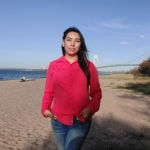Carla Rodrigo (English)
Hackettstown, New Jersey
Haga clic aquí para leer en español.
Carla Rodrigo works as a consultant for Peace New Jersey. She is available to consult with River Network members and other organizations to engage Spanish-speaking and Latinx members of their communities in conservation initiatives and/or design volunteer and community-based water quality monitoring programs. Carla is a contributing author to Guía de Monitoreo Participativo de la Calidad del Agua (2018), a Spanish-language guide for conducting participatory water quality monitoring activities. Carla may be reached at carlarodrigoh@gmail.com.
Over the past 18 months, River Network has partnered with People Enjoying Active Conservation in the Environment in New Jersey (PEACE NJ) and the Musconetcong Watershed Association on a community-led research project in Hackettstown, New Jersey. The organizations’ goal is to engage new community members in culturally-relevant conservation and environmental stewardship around the Musconetcong River – a Partnership Wild & Scenic River – as the town of Hackettstown experiences rapid demographic shifts with the influx of new residents immigrating from Central and South America. Carla Rodrigo was the community engagement lead on this project.
This interview was conducted in Spanish by Diana Toledo on May 18, 2023.
Diana Toledo: Tell me about your role at PEACE New Jersey.
Carla Rodrigo: PEACE NJ means “People Enjoying Active Conservation of the Environment.” PNJ is an NGO that is in charge of developing environmental and recreation programs that involve the entire population and all people who enjoy conserving and protecting the environment. [PEACE] works in Hackettstown, in the Musconetcong River Basin, and in the only urban population near this river.
Diana Toledo: How did you come into this work in the field of conservation and outdoor recreation?
Carla Rodrigo: I am an environmental engineer in my country of origin, Bolivia, so I have had the opportunity and experience of working on environmental conservation issues, especially related to water and vulnerable communities. Especially with the Indigenous communities in my country several years before immigrating here to the United States. That’s what I always knew how to do, right? Work with environmental issues, and I’ve tried to get involved in similar work here. One of these places has been PEACE NJ, where I am working as an environmental consultant.
In my country, one of the vulnerable populations are the Indigenous communities. Upon arriving here, I have been part of that community as a Latina, for many reasons. The difference in language, for example. I speak Spanish, my native language. So, by working with the Latino community in Hackettstown, making the connection between the Latino community and PEACE NJ, I have been able to use much of what I learned in Bolivia about how to integrate these communities. I have been able to practice these learnings here, too, in New Jersey, because I already know more or less what shortcomings or barriers are felt by these populations. Basically, these are the same problems in different geographies.
Diana Toledo: Tell me about the community-led research project that PEACE NJ conducted in Hackettstown in partnership with the Musconetcong Watershed Association and River Network. What problem were you trying to understand and solve?
Carla Rodrigo: We had two goals. One was to coordinate communication and translate educational materials that were already in place, or develop some new educational materials in Spanish. That was one of the projects: providing the editing and translating of that material. The other [goal] was to coordinate volunteers to interpret at events, and that became a basic way to integrate the community. And we wanted to know the barriers and preferences of this community (related to participation in stewardship activities and outdoor recreation) so that their engagement was effective within the projects that PEACE NJ has supported with River Network and the Musconetcong Watershed Association.
Diana Toledo: What lessons did you learn throughout the project that may help other organizations build relationships with similar communities: recent immigrant communities, people with language barriers, or Latino communities? Relationships that are not only positive, but relationships of trust that can lead to mutually beneficial collaborations?
Carla Rodrigo: We have had many lessons learned. One was that, when starting the project, [PEACE NJ] had preconceptions about the barriers they would face in the Latino community. And we were surprised. For example, they thought that one of the barriers would be language but, when carrying out the pilot surveys, we realized that not only did [the community] not have this language deficiency, but also that part of the population does not read in Spanish and couldn’t fill out the surveys. This was a surprise, even for me, because I did not imagine that they could not read or write in Spanish. Many of them come here to work, and work almost all day, so they have no time for outdoor recreation, so they felt limited in that regard. And the [non-English-speaking] people who do have free time for these activities did not have access to the information because the websites and social media pages of PEACE NJ were only in English. These were the only places they could find this information, but only if they knew [PEACE NJ] and had “liked” their Facebook page. But since [PEACE NJ] wasn’t known within Hackettstown, the information never reached the community members’ Facebook pages. At that time, PEACE NJ was not very visible in the Latino community because it was not open to new groups within the same social network that exist in Spanish.
We didn’t just identify language barriers or lack of time. [The community] also wanted better public transportation in Hackettstown because, according to what the surveys told us, there is not good public transportation in Hackettstown and not everyone has access to a car or a driver’s license. They also wanted the cost of registration or the equipment that they were going to use in recreational activities to be lower or even free because they do not have the financial means to register for those events.
They come from different cultures. Perhaps one thinks that Latin America is a single country, that the only thing that unites them is Spanish, but these are different countries with different cultures, different backgrounds.
Diana Toledo: Who is part of this community?
Carla Rodrigo: The Latino community are primarily from Ecuador, Guatemala, and Honduras. They are not from many countries in South America except Ecuador and Colombia.
Diana Toledo: Did you find differences within the different Latino community members in terms of interests or concerns?
Carla Rodrigo: At the beginning we mapped all the actors from all the organizations, local businesses, and groups within the social networks in which this community participates. That was the first step. Once we identified all the organizations, we had to try to establish a relationship of trust and knowledge. Know who we are, what we are doing, and why it is so important to understand their needs. You have to make yourself visible in the community and really establish a relationship. If not, they are not going to have that confidence and they are not going to share their perspectives.
When looking for Latino organizations in Hackettstown, I started looking for where there are organized people. I live here as an immigrant; I know that the churches are great community centers. They are already organized because they have a service orientation within the church, which translates into a service orientation within the community. That is why we have established relationships with three churches. Through these 3 churches, we were able to do a large number of surveys.
Diana Toledo: What’s your next step now?
Carla Rodrigo: Now that we know a little more about the barriers and the preferences, the next step is to adapt the programs that PEACE NJ already has. Or simply start new programs, because they are not in line with the needs that we have discovered. The next step is to readjust the programs so that [the community] can get more involved.
Diana Toledo: Returning to the personal: what keeps you motivated to continue doing community work?
Carla Rodrigo: I have always liked caring for the environment. One of the things that matters most to me is the interaction between people and the environment, because we are part of the environment and we are responsible for caring for our environment for future generations. That motivates me. More personally, I have always liked working on water issues: knowing how water cycles work and how human activities can sometimes affect a system that is so well thought out within the environment and that maintains such good balance to sustain life here. We are responsible for continuing to maintain that balance as human beings, that this is the only planet we know, and that we know can sustain humans.
Diana Toledo: Where do you see yourself in 5 to 10 years?
Carla Rodrigo: I would very much like to be able to validate my title and be able to practice here as an engineer. It really is what I’m passionate about. I don’t see myself working in anything other than environmental stewardship.
Diana Toledo: What impact would you like to see PEACE NJ have in the coming years?
Carla Rodrigo: First, that PEACE NJ can be recognized as an organization faithful to its principles – that they are people who enjoy active conservation of the environment. What does that mean? All people, including vulnerable populations, all people. That this can really be [PEACE NJ’s] motto and that the Latino community can be involved, which is what we are working on now. And that this community recognizes it as a great organization for the care of the environment and one they can trust. And that what we’re starting here can be a model that can be reflected across all of New Jersey.







